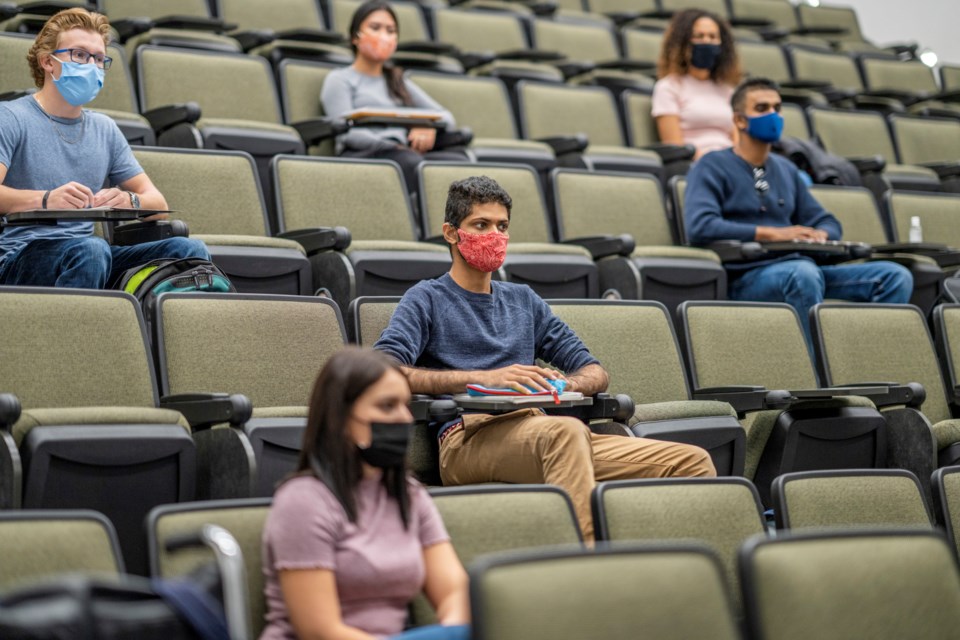PRINCE ALBERT - Declines in alcohol consumption, and increases in loneliness and just two of the effects researchers noticed in Healthy Campus Saskatchewan’s (HCSK) annual Canadian Campus Wellbeing Survey (CCWS).
HCSK rolled the survey out to more than 3,000 Saskatchewan post-secondary students in Spring 2021, with the goal of establishing baseline information around health and wellbeing on a provincial scale.
“The survey was created by some researchers at UBC and they piloted it in 2019 in British Columbia,” HCSK Strategic and Operational Lead Bev Drew said. “It's really great because previous to that post-secondary education institutions were using an American survey to get at the same kind of stuff but it didn't fit in so many ways.”
Data from the survey indicated most students felt their campus provided a respectful, inclusive climate and a supportive learning environment. The majority of students knew where to access mental and physical health services both on and off campus and believed there was a good support system for students who were going through difficult times. Students indicated they had high levels of social support, and risky alcohol use was comparatively lower than in previous surveys.
However, Drew said the answers may look very different in two years when they do the survey again. She pointed to the risky alcohol use, which was lower, but may not be directly correlated it to the pandemic.
“We can't say for sure but it probably has something to do with students weren't going out to bars and living on campus and partying like they might have been. That may have had a difference in alcohol use,” she said.
“We certainly understand from Canadian statistics that some people during the pandemic are drinking more but according to our data students are not.”
The pandemic has changed the way many people work and live, but it’s also affected how they socialize. Drew said the survey showed quite a few students considered themselves lonely.
Roughly 32 per cent of students reported severe mental distress, and another 28 reported low mental wellbeing. Drew said that’s slightly higher than previous surveys.
“There was some loneliness and isolation that they were experiencing and I would have to say that is probably pandemic related too,” she said.
“We are definitely concerned in terms of what more can we do collectively as post-secondary institutions to support these students,” she added. “We know the pandemic has had a large impact there too not only on students but on staff and faculty at all of our campuses. It has been very stressful. The shift to online classes has certainly been big.”
Another part of the survey asked students what was causing stress. These included concerns about the pandemic and the shift to online learning along with financial pressures and academic workload.
Drew said it as a mix of uncommon and common stressors.
“The financial stress and the academic workload have always been at the top for students across the board,” she explained.
Students from the University of Regina, University of Saskatchewan, and affiliates of both universities took part in the survey, as did students from the First Nations University of Canada, SIIT, Regional Colleges and Saskatchewan Polytechnic. Next time around HCSK hopes to have every institution involved.
In 2021, roughly 3,500 students filled out the survey, although only around 3,000 answered all the questions. They represented 17 post-secondary institutions in the province, which Drew said was a “pretty terrific” uptake.
“It was offered to a representative sample of students across the province and based on the demographics,” she said. “This is a fairly representative as a sample, so we can be pretty secure about it representing students in general.”
Each campus had to go through their ethics criteria to get permission to do it and it came out between February and June.
“Of course the later ones were at a disadvantage because exams had already happened but things never move the way we hope to,” Drew said.
In a release, she explained that the survey will provide the post-secondary education sector with rich data from Saskatchewan students that will help to understand their experience.
A big part of HCSK’s work is in supporting post-secondary education institutions as they adopt the National Standard for Mental Health and Well-Being for Post-Secondary Students. Healthy Campus Saskatchewan is also helping post-secondary education institutions build capacity by providing mental health train-the trainer programs to ensure campuses have access to certified trainers who can regularly deliver training to students, faculty, and staff.
The Government of Saskatchewan provided $326,000 to support HCSK over one and a half years from 2020 to 2022. $15,000 in project funding has been provided by the Medavie Health Foundation. Additional investments have been provided by in-kind contributions from post-secondary institutions and community partners.
For more information about HCSK visit, www.hcsk.ca




